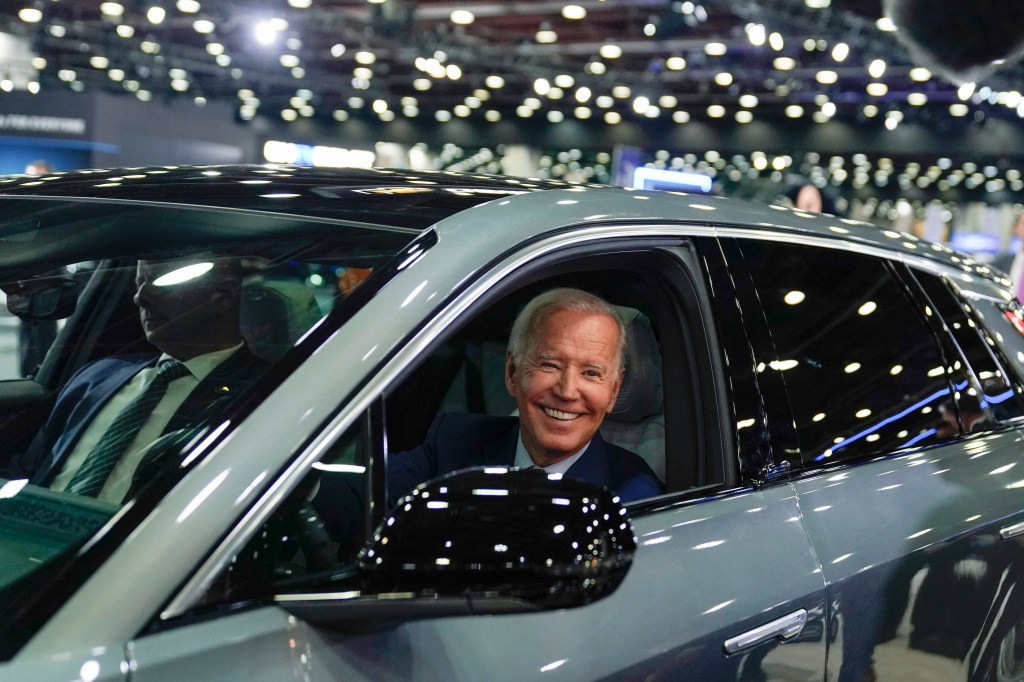Historic crackdown on gas cars will ensure two-thirds of vehicles will be electric, hybrid by 2032 after Biden admin finalizes new rule
The Biden administration finalized its crackdown on gas cars Wednesday, with the Environmental Protection Agency announcing drastic climate regulations meant to ensure more than two-thirds of passenger cars and light trucks sold by 2032 are electric or hybrid vehicles.
The EPA rule imposes strict limits on tailpipe pollution, limits the agency says can be met if 56% of new vehicles sold in the US are electric by eight years from now, along with 13% that are plug-in hybrids or other partially electric cars.
That would be a huge increase over current EV sales, which rose to 7.6% of new vehicle sales last year, up from 5.8% in 2022.
Despite the relatively low demand — which has led to auto manufacturers scaling back planned investment in electric vehicle manufacturing — the EPA insisted that carmakers have not had any “change in … intentions regarding PEVs generally or specifically.”
The EPA announcement also mentioned that the rule is separate from, but aligned with, the Biden administration’s stated 2021 goal of having 50% of all new US vehicles sold in 2030 be zero-emission.
The rule unveiled Wednesday is a scaled-down version of regulations proposed last April and withdrawn after backlash from the auto industry, but still represents the most aggressive attack on internal combustion of any country in the world.
The new rule slows implementation of stricter pollution standards from 2027 through 2029, before ramping up to near the level the EPA preferred by 2032.
“Our final rule delivers the same, if not more, pollution reduction than we set out in our proposal,’’ EPA Administrator Michael Regan told reporters, adding the rules would prevent more than 7 billion tons of carbon emissions over the next three decades and provide nearly $100 billion in benefits including lower health care costs, and more than $60 billion in reduced annual costs for fuel, maintenance and repairs.
“These new standards are so important,” he said, “for public health, for American jobs, for our economy and for our planet.”
The United Automobile Workers union expressed its support of the ruling, saying the EPA seriously took “the concerns of workers and communities” into account in changing their proposed plan.
The union had been wary of the speed with which the rule would have been imposed under the April 2023 proposal, in part because electric vehicles have fewer parts which require fewer workers to produce.
“Today, we’re setting new pollution standards for cars and trucks,” Biden said in a statement. “And you have my word: US workers will lead the world in making autos, each stamped ‘Made in America.'”
Other industry groups slammed the regulation, with the American Petroleum Institute saying it would “make new gas-powered vehicles unavailable or prohibitively expensive for most Americans. For them, this wildly unpopular policy is going to feel and function like a ban.
“Whether you’re a Republican or Democrat, Congress has to make a decision whether to protect consumer choice, US manufacturing workers and our hard-won energy security by overturning this deeply flawed regulation,” it added. “Short of that, our organizations are certainly prepared to challenge it in court.”
“These regulations represent yet another step toward an unrealistic transition to electric vehicles that Americans do not want and cannot afford,” added Sen. Shelly Moore Capito (R-WV).
West Virgina’s other senator, Democrat Joe Manchin, insisted: “The federal government has no authority and no right to mandate what type of car or truck Americans can purchase for their everyday lives. This reckless and ill-informed rule will impose what is effectively an EV mandate without ensuring the security of our supply chains from nations like China.”
Senate Minority Leader Mitch McConnell (R-Ky.) said Biden’s “climate agenda puts activists ahead of American workers: Freezing new export permits, micromanaging home appliances, and now trying to rig the auto market for expensive EVs. Democrats are willing to trade working families’ livelihoods for kudos from their radical base.”
As Biden faces a tight re-election battle, he is juggling his stated commitment to lowering greenhouse emissions while courting the auto manufacturing industry, whose workers are a key demographic in battleground states like Michigan.
Former President Donald Trump and Biden’s Republican opponents have accused the president of handing the economic advantage to China with the restrictions, since many electric vehicles are manufactured in America’s great geopolitical rival.
“He’s selling you out to China,” Trump told a crowd of Michigan auto workers in September. “He’s selling you out to the environmental extremists and the radical left.”
This past weekend in Ohio, Trump warned of a “bloodbath” in the US auto industry if Biden is re-elected, referring to foreign imports including China-made electric cars undercutting American vehicles.









